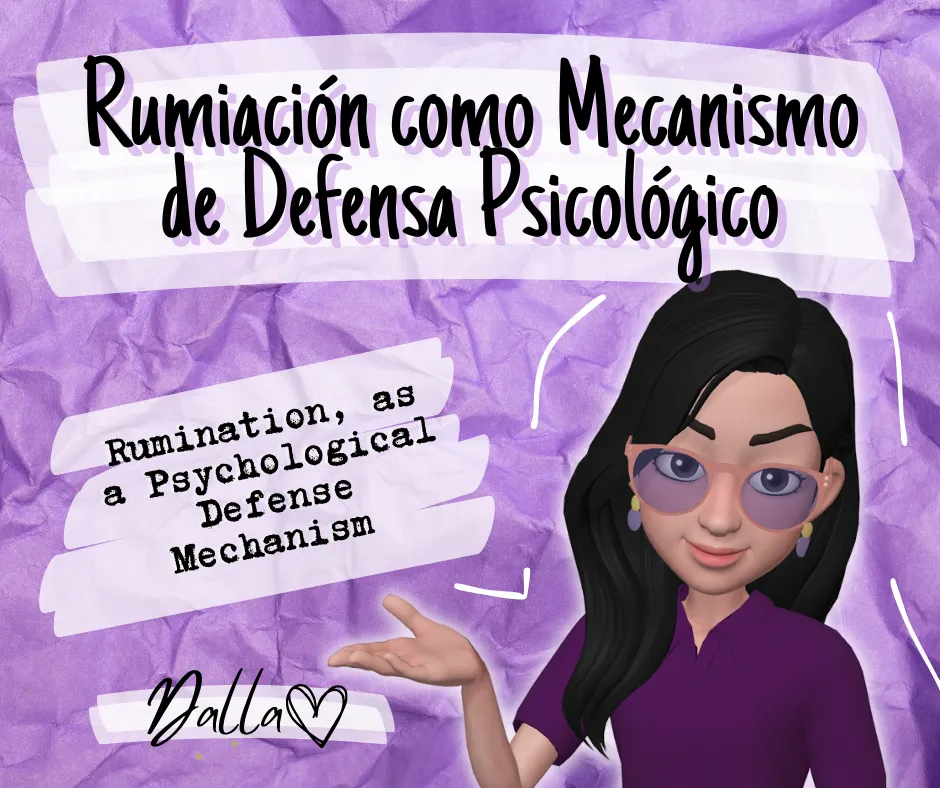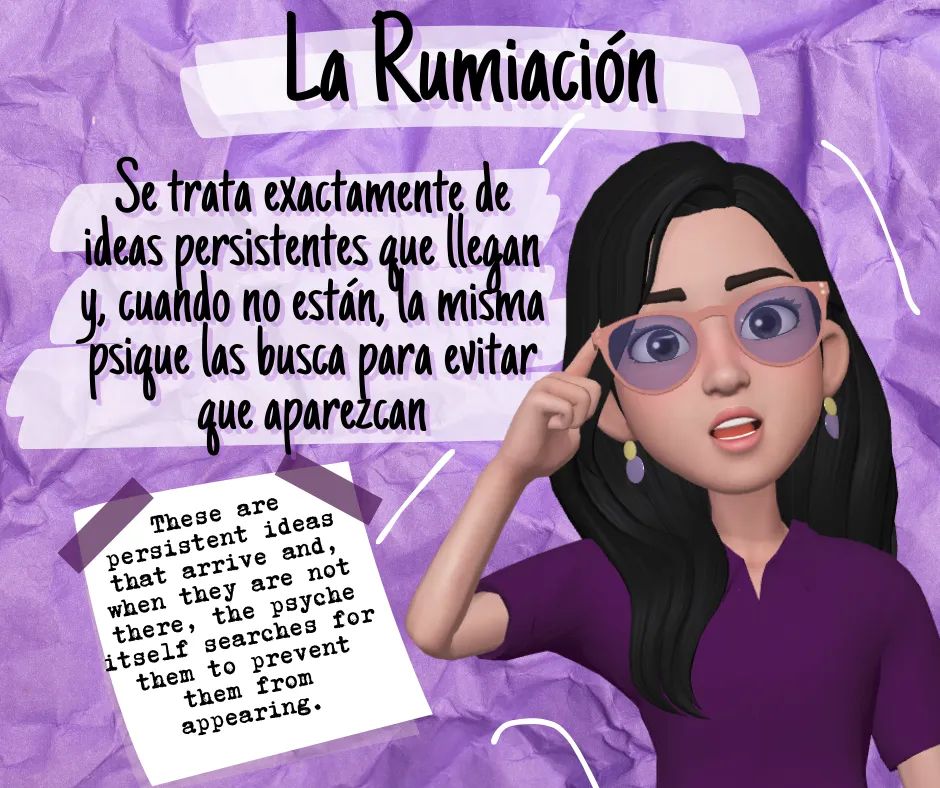

Cuando escuchamos o leemos esta palabra ¿Qué es lo primero que se nos viene a la mente? Los Rumiantes ¿Cierto? Sí, un tipo de animal y ¿Por qué los llamamos así? ¿Lo sabes? ¿Qué tiene que ver todo esto con psicoeducación? Pues, tengo la respuesta a todas estas interrogantes a continuación, así que sigue leyendo si quieres enterarte…
When we hear or read this word, what is the first thing that comes to mind? Ruminants, right? Yes, a type of animal and why do we call them that? Do you know? What does all this have to do with psychoeducation? Well, I have the answer to all these questions below, so read on if you want to find out…

En primer lugar, debemos saber que la Rumiación en Psicología es un Mecanismo de Defensa Psicológico y colocaron su nombre basándose justo en esos animales, “los rumiantes”, básicamente porque ellos practican “la rumia”, y ¿en que se basa la rumia?
Así que, según los científicos, básicamente rumiar es devolver el contenido tragado a la boca para volverlo a masticar y tragar nuevamente, hasta hacerlo más pequeño y digerible. Suena un poco asqueroso, lo sé, pero es un mecanismo llevado a cabo por algunos animales, como las vacas con el pasto que consumen.
El asunto es que este proceso fue la metáfora perfecta que encontraron algunos psicólogos para nombrar este mecanismo mediante el cual la persona recuerda constantemente algo y termina haciendo que ese recuerdo intervenga en su vida influenciándola de forma negativa, hasta llegar al punto de poder desarrollar una Enfermedad Mental.
Les pondré un ejemplo para que lo entiendan mejor y sepan la razón del por qué quise hablar de este mecanismo en este post.
First of all, we must know that Rumination in Psychology is a Psychological Defense Mechanism and they placed its name just based on those animals, "the ruminants", basically because they practice "rumination", and what is rumination based on?
Rumination: It consists of regurgitating the consumed food to chew it and mix it with saliva, reducing the particle size and exposing the carbohydrates in the fiber for bacterial fermentation by the microorganisms that live in the stomach.
So, according to scientists, basically ruminating is returning the swallowed contents back to the mouth to be chewed and swallowed again, until it is smaller and digestible. It sounds a bit gross, I know, but it is a mechanism carried out by some animals, such as cows with the grass they consume.
The thing is that this process was the perfect metaphor that some psychologists found to name this mechanism by which the person constantly remembers something and ends up making that memory intervene in his life influencing it in a negative way, to the point of being able to develop a Mental Illness.
I will give you an example so that you understand it better and know the reason why I wanted to talk about this mechanism in this post.



Hace poco tuve una cita con un paciente que me pidieron evaluar por un dolor en una pierna, el paciente parecía estar claro de la razón del por qué tenía ese dolor, era que había estado preso cuando era joven y recibió torturas en la época dictatorial de nuestro país, golpes que fueron principalmente en la región lumbar.
Muchos sabemos que los nervios de los miembros inferiores provienen de la región lumbar, así que esa era la razón de su dolor, traumatismos múltiples en región lumbares secuelares que ocasionan una lumbociatalgia crónica.
Ustedes se preguntarán ¿Entonces por qué me llamaron a mí para ir a evaluarlo? La respuesta es que porque, para mi sorpresa, esa era la menor de las preocupaciones de mi paciente.
Mientras lo evaluaba y hablaba con él para realizarle la evaluación cognitiva, emocional y física, estuvo hablándome todo el tiempo de un recuerdo del pasado, hablaba de su primer amor, que fue justo en la época en la que estuvo preso y recibió todos esos golpes, el señor me hablaba con añoranza y mientras hablaba se le quebraba un poco la voz.
Me decía que no tenía problemas con su actual esposa, que él la amaba, pero que le gustaría saber que fue de la vida de ese amor, y que tiene unas personas que lo visitan y él aprovecha de decirles que la busquen y traten de encontrarla, además ha buscado por el teléfono la dirección de la, actualmente, señora de 80 y tantos años, me contó que ha tenido una que otra discusión con su actual esposa porque ella dice que él tiene una idea persistente y que es la que lo está enfermando.
Pues, la esposa del señor tenía razón en haberme llamado, porque en efecto el señor en las 2 horas que estuve con él en consulta toda la conversación rondó en torno a ese amor perdido, de hecho, todo lo llevaba a ese recuerdo, me dijo incluso que no dormía mucho, porque a la hora de dormir era cuando más se acordaba de ella, se despertaba esperando que ella estuviera bien y verla en algún momento antes de morir para pedirle disculpas y regalarle un ramo de flores.
Como ven es un recuerdo bonito en realidad, es la añoranza de un amor juvenil perdido, pero, lamentablemente, ese recuerdo y la partícipe de él, se está convirtiendo en un problema para el señor, porque su psique está dejando de manejar bien la situación y puede caer en declive en cualquier momento haciéndolo desarrollar una enfermedad emocional.
Recently I had an appointment with a patient that I was asked to evaluate because of a pain in one leg, the patient seemed to have clear the reason why he had that pain, it was that he had been imprisoned when he was young and received tortures during the dictatorial era of our country, blows that were mainly in the lumbar region.
Many of us know that the nerves of the lower limbs come from the lumbar region, so that was the reason for his pain, multiple traumas in the lumbar region causing chronic lumbosciatic pain.
So why was I called in to evaluate him? The answer is because, to my surprise, that was the least of my patient's concerns.
As I was evaluating him and talking to him to do the cognitive, emotional and physical evaluation, he was talking to me all the time about a memory from the past, he was talking to me about his first love, which was right around the time he was in jail and got all those beatings, he was talking to me with longing and as he was talking his voice was cracking a little bit.
He told me that he had no problems with his current wife, that he loved her, but that he would like to know what happened in the life of that love, and that he has some people who visit him and he takes the opportunity to tell them to look for her and try to find her, he has also looked for the address of the 80-something lady by phone, he told me that he has had some discussions with his current wife because she says that he has a persistent idea and that is what is making him sick.
Well, the gentleman's wife was right to have called me, because indeed the gentleman in the 2 hours I was with him in consultation all the conversation revolved around that lost love, indeed, everything led him to that memory, he even told me that he did not sleep much, because at bedtime was when he remembered her the most, he woke up hoping that she was well and see her at some point before he died to ask her forgiveness and give her a bouquet of flowers.
As you can see it is a nice memory actually, it is the longing for a lost love of youth, but, unfortunately, that memory and being part of it, is becoming a problem for the gentleman, because his psyche is ceasing to handle the situation well and can fall into decay at any time making him develop an emotional illness.



La Rumiación se trata exactamente de esto, de ideas persistentes que llegan y, cuando no están, la misma psique las busca para evitar que aparezcan ¿Tiene sentido esto? Pareciera que no mucho, pero, así es.
Nuestra psique intenta prevenir la aparición de la idea tan rápidamente que se vuelve constante, tan constante, que afecta completamente el desenvolvimiento de su vida y puede terminar con un problema emocional severo.
Para finalizar la historia del señor que les conté del ejemplo, quedé en verlo nuevamente después de descartar algunos problemas físicos que es mi obligación descartar, pero desde que lo evalué estoy completamente convencida de que más allá de su problema físico crónico no hay algo físico agudo, y que su problema principal es emocional, por ello seguiré en contacto con él, hasta ver si evoluciona de forma satisfactoria realizando además su terapia psicológica porque su dolencia actual es una somatización de esa Rumiación y para salir de ella necesita, más que medicamentos, psicoterapia.
Espero que mi post haya servido para educarlos un poco sobre este Mecanismo de Defensa Psicológico y sepan cómo, algo que parece inocente, puede terminar en el desarrollo de algo tan difícil de controlar.
**This is exactly what Rumination is about, persistent ideas that come and, when they are not there, the psyche itself looks for them to prevent them from coming. It may not seem to make much sense, but it does.
Our psyche tries to prevent the appearance of the idea so quickly that it becomes constant, so constant, that it completely affects the development of your life and can end up with a severe emotional problem.
To finish the story of the man I told you about the example, I agreed to see him again after ruling out some physical problems that it is my obligation to rule out, but since I evaluated him I am completely convinced that beyond his chronic physical problem there is not something acute physical, and that his main problem is emotional, so I will continue in contact with him, to see if he evolves satisfactorily, also doing his psychological therapy because his current ailment is a somatization of that Rumination and to get out of it he needs, more than medication, psychotherapy.
I hope my post has served to educate you a little about this Psychological Defense Mechanism and you know how, something that seems innocent, can end up in the development of something so difficult to control.



DeepL
|Twitter|
